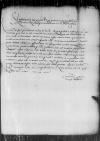Quod petit a nobis Paternitas Vestra, ut liberum per nos ei sit Provincial Diet of Royal Prussia ⌊comitiisProvincial Diet of Royal Prussia ⌋ non interesse, eam nos libertatem nemini dare consuevimus. Sed si cui tamen iustae causae sunt, quamobrem comitiorum diem non obeat, facile illi veniam concedimus. Indulgere autem alicui, ut officio suo ne fungatur, nobis minime licet.
Quamobrem quas causas Paternitas Vestra habeat, cur ad Provincial Diet of Royal Prussia ⌊comitiaProvincial Diet of Royal Prussia ⌋ proficisci recuset, ipsa viderit. Si iustae satis et graves fuerint, nos illas accipiemus, modo ne crebrius illis utatur. Cum enim primas Royal Prussia (Prussia Regalis), region, part of Prussia annexed to the Kingdom of Poland in 1466 under the provisions of the Second Peace of Thorn⌊terrarum nostrarum PrussiaeRoyal Prussia (Prussia Regalis), region, part of Prussia annexed to the Kingdom of Poland in 1466 under the provisions of the Second Peace of Thorn⌋ sit Paternitas Vestra, multum in eo positum esse videmus intersit comitiis, necne. Quod periculum est, ne alii quoque illius exemplo sibi abesse fas esse putent.
Bene valeat.


 BCz, 1601, p. 368
BCz, 1601, p. 368